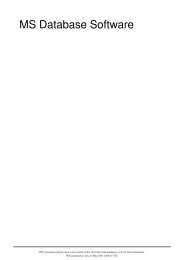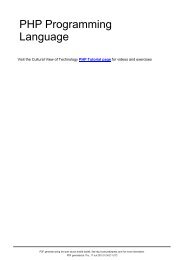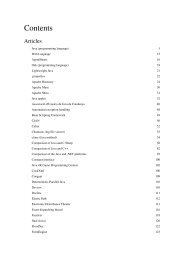Structured Query Language (SQL) - Cultural View of Technology
Structured Query Language (SQL) - Cultural View of Technology
Structured Query Language (SQL) - Cultural View of Technology
Create successful ePaper yourself
Turn your PDF publications into a flip-book with our unique Google optimized e-Paper software.
PL/<strong>SQL</strong> 75<br />
User-defined exceptions are always raised explicitly by the programmers, using the RAISE or<br />
RAISE_APPLICATION_ERROR commands, in any situation where they have determined that it is impossible for<br />
normal execution to continue. RAISE command has the syntax:<br />
RAISE ;<br />
Oracle Corporation has pre-defined several exceptions like NO_DATA_FOUND, TOO_MANY_ROWS, etc. Each<br />
exception has a <strong>SQL</strong> Error Number and <strong>SQL</strong> Error Message associated with it. Programmers can access these by<br />
using the <strong>SQL</strong>CODE and <strong>SQL</strong>ERRM functions.<br />
The DECLARE section defines and (optionally) initialises variables. If not initialised specifically, they default to<br />
NULL.<br />
For example:<br />
declare<br />
number1 number(2);<br />
number2 number(2) := 17; -- value default<br />
text1 varchar2(12) := 'Hello world';<br />
text2 date := SYSDATE; -- current date and time<br />
begin<br />
end;<br />
SELECT street_number<br />
INTO number1<br />
FROM address<br />
WHERE name = 'INU';<br />
The symbol := functions as an assignment operator to store a value in a variable.<br />
The major datatypes in PL/<strong>SQL</strong> include NUMBER, INTEGER, CHAR, VARCHAR2, DATE, TIMESTAMP, TEXT<br />
etc.<br />
Functions<br />
Functions in PL/<strong>SQL</strong> are a collection <strong>of</strong> <strong>SQL</strong> and PL/<strong>SQL</strong> statements that perform a task and should return a value<br />
to the calling environment. User defined functions are used to supplement the many hundreds <strong>of</strong> functions built in by<br />
Oracle.<br />
There are two different types <strong>of</strong> functions in PL/<strong>SQL</strong>. The traditional function is written in the form:<br />
CREATE OR REPLACE FUNCTION [(input/output variable declarations)] RETURN return_type<br />
[AUTHID ] <br />
BEGIN<br />
[Exception<br />
END;<br />
[declaration block]<br />
<br />
RETURN ;<br />
exception block]<br />
RETURN ;<br />
Pipelined Table Functions are written in the form:<br />
CREATE OR REPLACE FUNCTION [(input/output variable declarations)] RETURN return_type<br />
[AUTHID ] []










